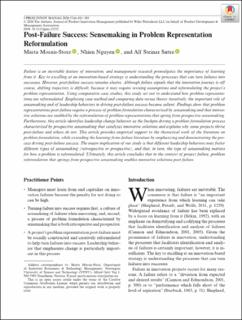Post-failure success: sensemaking in problem representation reformulation
Peer reviewed, Journal article
Published version
Permanent lenke
https://hdl.handle.net/11250/2722396Utgivelsesdato
2020Metadata
Vis full innførselSamlinger
- Institutt for økonomi og it [152]
- Publikasjoner fra CRIStin [3416]
Originalversjon
Morais‐Storz, M., Nguyen, N., & Sætre, A. S. (2020). Post‐Failure Success: Sensemaking in Problem Representation Reformulation. Journal of Product Innovation Management, 37(6), 483-505. https://doi.org/10.1111/jpim.12552Sammendrag
Failure is an inevitable feature of innovation, and management research promulgates the importance of learning from it. Key to excelling at an innovation‐based strategy is understanding the processes that can turn failures into successes. However, post‐failure success remains elusive. Although failure signals that the innovation journey is off course, shifting trajectory is difficult, because it may require revising assumptions and reformulating the project’s problem representation. Using comparative case studies, this study set out to understand how problem representations are reformulated. Employing case method and comparing data versus theory iteratively, the important role of sensemaking and of leadership behaviors in driving post‐failure success became salient. Findings show that problem representations post‐failure require a process of problem formulation characterized by sensemaking and that innovative solutions are enabled by the reformulation of problem representations that spring from prospective sensemaking. Furthermore, this article identifies leadership change behavior as the linchpin driving a problem formulation process characterized by prospective sensemaking that catalyzes innovative solutions and explains why some projects thrive post‐failure and others do not. This article provides empirical support to the theoretical work of the literature on problem formulation, while extending the learning‐from‐failure literature by emphasizing and demonstrating the process driving post‐failure success. The major implication of our study is that different leadership behaviors may foster different types of sensemaking (retrospective or prospective), and that, in turn, the type of sensemaking matters for how a problem is reformulated. Ultimately, this article concludes that in the context of project failure, problem reformulation that springs from prospective sensemaking enables innovative solutions post‐failure.

